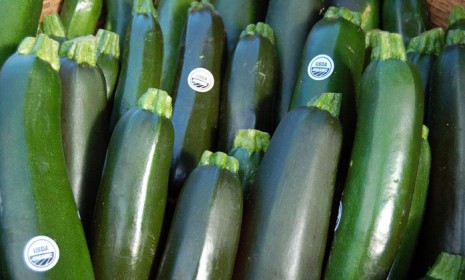Is organic food a waste of money?
A massive new study finds that conventional groceries typically offer the same nutritional value as their more expensive organic shelf-mates

A free daily email with the biggest news stories of the day – and the best features from TheWeek.com
You are now subscribed
Your newsletter sign-up was successful
Buying organic "might not be worth the money," says Rene Lynch at the Los Angeles Times. A large Stanford University study published in the Annals of Internal Medicine finds that organic foods fail to offer any additional health benefits over cheaper, conventional groceries. Does that mean you should stop buying organic entirely? Here, a concise guide to the research:
How was this study conducted?
Researchers collected 200 peer-reviewed studies that examined the differences between organic and conventional food. A few of these studies followed subjects who switched from organic to regular food, or vice versa, to see if it made any difference in their overall health, while others looked specifically at various foods' nutritional content. One study, for example, examined whether organic meat influences the risk of "Campylobacter infection, a bacterial food-borne illness," says Allison Aubrey and Dan Charles at NPR. Another looked at whether the children of pregnant mothers on organic diets were more likely to develop allergic conditions. None of the studies lasted longer than two years.
The Week
Escape your echo chamber. Get the facts behind the news, plus analysis from multiple perspectives.

Sign up for The Week's Free Newsletters
From our morning news briefing to a weekly Good News Newsletter, get the best of The Week delivered directly to your inbox.
From our morning news briefing to a weekly Good News Newsletter, get the best of The Week delivered directly to your inbox.
What did researchers find?
That there's a "definitive lack of evidence" for the conventional wisdom that organic food provides extra health benefits, says lead researcher Crystal Smith-Spangler at the Stanford University School of Medicine. Overall, there is "no discernible difference between the nutritional content" of organic and regular food, says BBC News, other than the fact that organic food is 30 percent less likely to contain pesticides.
Why isn't organic food healthier?
"Here's the basic reason," says NPR's Aubrey and Charles: "When it comes to their nutritional quality, vegetables vary enormously, and that's true whether they are organic or conventional." Consider the carrots in your grocery store: One "may have two or three times more beta carotene (which gives us Vitamin A) than its neighbor. That's due to all kinds of things: differences in the genetic makeup of different varieties, the ripeness of the produce when it was picked, even the weather." The bottom line, says Smith-Spangler, is "you can't use organic as your sole criteria for judging nutritional quality."
A free daily email with the biggest news stories of the day – and the best features from TheWeek.com
Should I stop buying organic food?
Not necessarily. Organic food is preferable for plenty of other reasons besides health, says Doug Barry at Jezebel. For instance, consider animal welfare and environmental sustainability. Plus, limiting exposure to pesticides is probably a good thing. In terms of improving your nutrition intake, however, "there isn't much difference between organic and conventional foods, if you're an adult and making a decision based solely on your health," says Smith-Spangler. "We were a little surprised."
Sources: BBC, Jezebel, Los Angeles Times, NPR
-
 Is Andrew’s arrest the end for the monarchy?
Is Andrew’s arrest the end for the monarchy?Today's Big Question The King has distanced the Royal Family from his disgraced brother but a ‘fit of revolutionary disgust’ could still wipe them out
-
 Quiz of The Week: 14 – 20 February
Quiz of The Week: 14 – 20 FebruaryQuiz Have you been paying attention to The Week’s news?
-
 The Week Unwrapped: Do the Freemasons have too much sway in the police force?
The Week Unwrapped: Do the Freemasons have too much sway in the police force?Podcast Plus, what does the growing popularity of prediction markets mean for the future? And why are UK film and TV workers struggling?